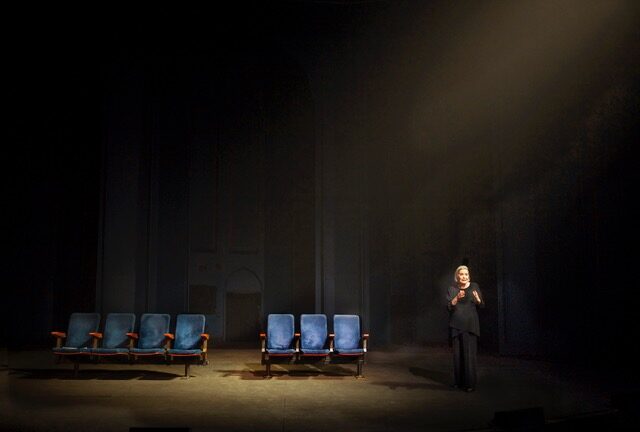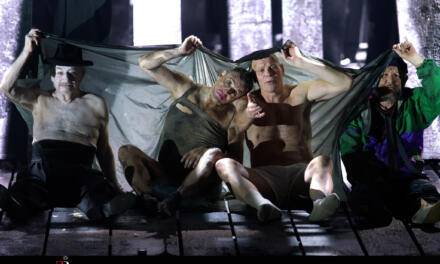2018 was a good year for veteran Spanish actress Nuria Espert. Two years after winning the Princess of Asturias Prize for the Arts, Espert was awarded the Europe Theatre Special Prize acknowledging a career in theatre lasting over sixty-five years. And she’s still working at 83. 2019 sees her on tour, both nationally and internationally, with a piece she created with director Lluís Pasqual in late 2018. The sixty-minute Romancero Gitano (English title Gypsy Ballads), is a highly personal reflection on her relationship with the work of Federico García Lorca which encompasses work as an actor on Yerma (1971), Doña Rosita (1980) and The House Of Bernarda Alba (2009)—the latter a play she also directed in 1996—as well as recitals of his poetry. First presented at Madrid’s Teatro de la Abadía between 17 October and 11 November, it was due to be performed in an edited form in St. Petersburg for the Theatre Prize events. Espert, however, suffered an accident at the dress rehearsal breaking her wrist. The show went on in Madrid but performances outside the Spanish capital have had to wait until now.
Gypsy Ballads is, as the title suggests, a recital of Lorca’s 1928 anthology of poems. But for those that recall Espert’s poetry recitals with Rafael Alberti in the late 1970s and early 1980s, Aire Y Canto de la Poesía (English title Air And Song Of Poetry), as well as her later work with Pasqual on La Oscura Raíz (English title The Dark Root) in 1998, this is a similar return to poetry as storytelling. Traces of her earlier Lorca roles also run through the staging. The complication of poems that Pasqual and Espert have selected is both a comment on the collection first published 91 years ago and a reflection on Pasqual and Espert’s performative journeys with Lorca over 48 years. The poems serve as a springboard, a way of thinking through what it means to perform Lorca’s work, how the mouth enunciates, how the body shifts. Drawing on Lorca’s famed lectures, Espert performs one of her own where her words and those of Spain’s most prominent twentieth-century poet and dramatist meld.
Two blocks of theatre seats are positioned on the stage: a block of four to the right, a block of three to the left. Espert emerges from the back of the stage in a simple loose-fitting two-piece trouser suit. She greets the audience, script in hand, with a warm address, “Good evening.” She begins reading words that belong to Lorca, but they could be hers or Pasqual’s—who is responsible for the script as well as the direction. An anecdote where Lorca creates a sense of intimacy, speaking of creating the illusion that he is reading Gypsy Ballads to friends in his room, is appropriated by Espert.
Espert, however, provides another side to the exuberant Lorca of popular mythology. His public ebullience masked a timidity, a need to prepare each and every lecture like a script. Espert speaks of him needing to take someone’s arm, even that of a stranger, to cross the street. He may have given the impression of improvising, but this was an illusion. Everything was methodically written down like a script of sorts that Lorca chose to adhere to; he was “like an actor,” taking on the words of an “other” even though these words were those that he had written himself. The performative dimension seemed to proffer a sense of security rendered through duende—the thrill of the live—that Espert conjures in the performance. Duende is the performative fire that creates “the other;” it propels her into “Ballad of the Moon, Moon” the first poem in the collection. Pascal Merát’s lighting shifts to a silver blue as a breathless Espert embodies the tale of a boy warning the moon of the arrival of gypsies before he himself is carried away by that same moon. Espert moves between two voices—that of the moon and that of the boy—a breathless sense of energy propels the action as the voices interlock. Espert looks down in personifying the moon who asks the boy to leave and not tread on her “starched whiteness.”
The lighting shifts again to a warmer wash as Espert shares stories of her childhood, growing up in a working-class home without books. She recalls her father bringing home an edition of Gypsy Ballads and copying out a number of poems all night, including “Ballad of the Moon, Moon,” which he transcribed for her, a poem she then went on to recite at the Art’s Nests, venues where the working classes congregated for artistic activities. A slight shift of the head and Espert is now embodying Lorca’s words on the “Gypsy Ballads,” and moving to the second and third poems in the collection. She is at the edge of her seat, almost breathless as she urgently tells the story of “Preciosa and the Air,” a woman pursued aggressively by the wind. A gentle drumming underscores her recital, a pulse that propels her forward like the breeze that pursues Preciosa. For “The Quarrel” there is a red light that bathes the stage, foretelling that blood will be spilt—the echoes with the spat in Blood Wedding are palpable. Espert’s arms carve through the air like the poem’s black angels with wings as wide as knives. She uses Lorca’s words to introduce the poem as a tale of senseless violence; an attack that has no explainable reason; the mystery of the unknown. In an era of irrationality, this motif echoes through the auditorium.
Espert has described each of the poems as a “tiny theatre play” and narrative clarity is central to the ways in which she performs them. “My voice is marked by Lorca” she commented to me later that evening. She carries with her the layers of those who have performed the works before her. Espert mouths the words to Paco Ibáñez’s version of the “Song of the Rider,” a further recognition of the ways in which Lorca’s words have had new lives through the lives, bodies, and music of others. For “Ballad of the Black Sorrow,” Espert stands; her body coils and scrunches as she becomes Soledad Montoya. She places her hands on her hips she appropriates the role of the narrator who confronts Soledad.
Lorca’s view of theatre as a communal act is appropriated by Espert as the governing motif of the production. Espert’s act of sharing involves giving voice to Lorca’s women, figures that she has already embodied onstage. These roles haunt her performance: her arms reach out recalling the desperation of the childless Yerma; the tinges of melancholy could be those of the abandoned Doña Rosita; the lament has echoes of the Mother in Blood Wedding that she performed in a reflection on the performance of Lorca’s work, also conceived with Pasqual, Haciendo Lorca (English title Making Lorca, 1996). Espert is bathed in mustard yellow light for Mariana Pineda; the pitch of her voice is lowered for Blood Wedding. Her hand leans on the seat for support as Rosita
The lighting sculpts her face as she recites St Gabriel, her hand raised at the poem’s opening, her voice taut as she evokes “the skin of an apple at night.” She moves her arms as if cradling the child in the poem’s penultimate verse. For “Sleepwalking Ballad,” which Lorca referred to as his favorite poem in Gypsy Ballads, she stands and then turns around; her voice echoes through the auditorium, a cold blue light creates an eerie ambiance. She walks across the stage and complicity shares the tale with the audience. She shifts from character to character with precision, her voice shifting to ensure difference is crisp and clear, the head arching to point to a change of speaker. Espert does not try to disentangle the poem’s mysteries, quoting Lorca’s open acknowledgment of the poem’s secrets: “nobody knows what happens, not even me.” Rather the focus is on a tale of pursuit with a disturbing sexual symbolism where desire propels an elusive narrative, a desire made palpable by the breathless energy and pace of Espert’s delivery. Espert recollects reciting the poem with Rafael Alberti, silence following the intensity of their duet. And of hearing Alberti speak of eating half a cold melon on a hot summer night in Madrid, asking Lorca about a poem whose mysteries he could not himself unpick.
For “Death of Little Tony el Camborio,” she stands behind one of the blocks of seating, leaning forward with breathless excitement. There’s a desperation to her voice as she shares the tale of Tony’s death. Part lamentation, part observation, there is a slight hush in tone at the poem’s end. It’s a rendition that gains spontaneous applause from the audience. For “Thamar and Amnón,” the audience is lulled into a false sense of security with a warm light. She embodies both the brother overwhelmed by desire and the sister who he rapes. Her body turns from one to the other, her moves quick and abrupt. As Amnón she comes forward menacingly like a giant bat. Her hands hack through the air as she refers to David severing the harp’s strings with a pair of scissors. The narrative has echoes of the dual roles of victim and perpetrator that she took on in The Rape Of Lucrecia in 2009.
The final section of the piece positions the Gypsy Ballads within a broader body of Lorca’s work. Lorca’s words on Amargo “the angel of death and the despair that Andalusia’s doors hold” offers a bridge to “Song of the Mother of Amargo” from the Deep Song collection, written in 1921. Espert’s move into the Mother’s final speech from Blood Wedding allows for both a reflection of the role actresses played in shaping Lorca’s dramaturgy and of the broader geneology of actresses—within which Espert can be positioned—who have promoted Lorca’s work. Espert may never have seen Margarita Xirgu perform live but she admits she has listened to recordings of her voice and learned from her. She also played Xirgu at Madrid’s Teatro Real in Golijov’s opera Ainadamar (2012). It is as if Xirgu’s ghost inhabits the stage with Espert, they are walking together with Lorca and Pasqual, both a palimpsest and an acknowledgment of the different contributions made by actors and directors to the canonization of Lorca.
Ballad Of The Civil Guard opens with the sound of the trotting of a horse. It is a beat which is used by Espert as an accompaniment, a metrodome. Espert shares the story with the audience as a tale of injustice and exploitation that demands to be told. Espert’s eyes look out in terror at what she sees before her. She positions Lorca at the poem’s end not only as a poet of death but as a poet of love. The Sonnet Of Dark Love is recited gently, softly, intensely. It is almost a plea on her part: “don’t let me lose what I have won.” Espert may speak of “the black Spain of that moment” when Lorca was killed but there are echoes with the present that the production negotiates with levity. Espert stands behind the seats to deliver the final poem Cry To Rome. Her voice slices through the air like the silver swords shaving through apples. Imagery from the poems is not illustrated by her gestures but commented or expanded on. She clutches her blouse with desperation and fear. The poem’s imagery is cruel and painful: “clouds cut by a coral hand…./sharks like tear-drops/roses that wound.” She spits the words out and they ring through the air; it is almost a tone of hysteria, of panic in the streets that took me back to Pasqual’s production of The Public in 1987. Espert’s voice rings out with the “crowd of laments.” There are moments of lyricism, as when she describes the statues bereft of “love below the complete crystal eyes.” Bells toll in the distance—part of Roc Mateu’s rich soundscape. Her face crunches at “the multitudes with hammer, violin, and clouds” and then there is stillness as the poem reaches its end “because we want Earth’s will to be done so she gives her fruits to all;” the stage then turns to black.
Espert’s performance is one focused on the act of storytelling: the sense of intimacy, urgency, and complicity with which she recites the poems; the mood of informality with which she shares information about her childhood and friendship with Alberti. The abrasive language of the poems then cuts abruptly through the mood of informality, part of the contrasts set up in the production. At first, it is not clear if Espert is reading from a script or not. The script is soon revealed as just a prop to create the informality of a rehearsal, a reading like those given by Lorca when sharing work with friends. Pascal Merát’s lighting creates a different mood for each poem from the glacial, mordant light of the moon to an ominous red wash. Pasqual’s production is lean and bereft of any distractions that remove the focus from Espert. Roc Mateu’s soundscape creates a percussive rhythm, a baseline to Espert’s sonorous voice. Espert demonstrates a resolve and sense of purpose in this recital. These are poems that demand to be shared and share them she does interweaving the personal and the political in ways that demonstrate why she remains such an important artist with a clear sense of purpose in an age where political commitment too often incurs government wrath.
Gypsy Ballads is on tour throughout 2019.
This post was written by the author in their personal capacity.The opinions expressed in this article are the author’s own and do not reflect the view of The Theatre Times, their staff or collaborators.
This post was written by Maria Delgado.
The views expressed here belong to the author and do not necessarily reflect our views and opinions.


















